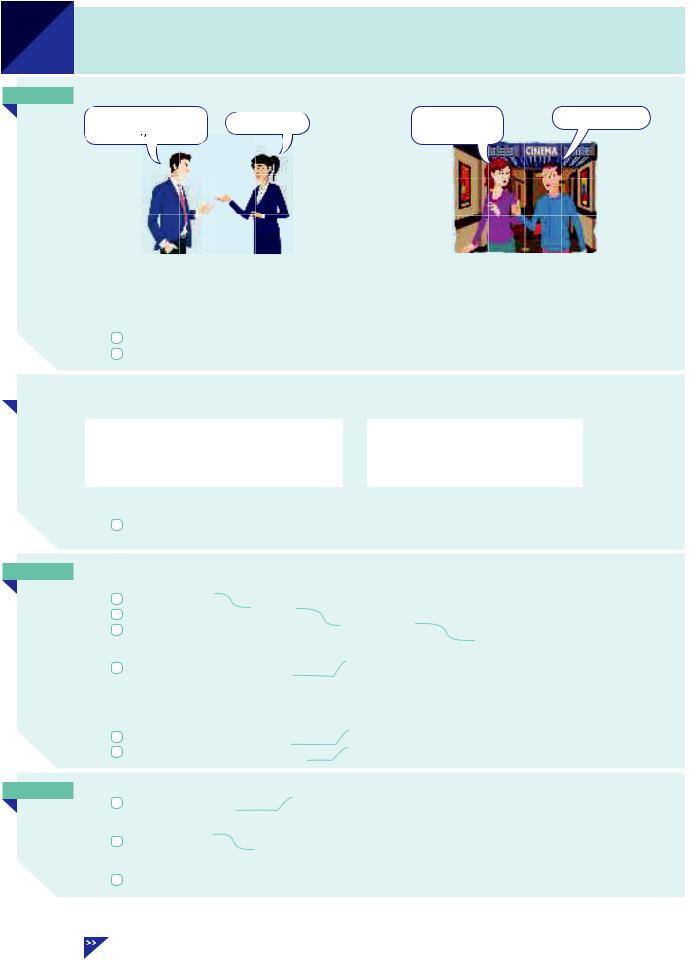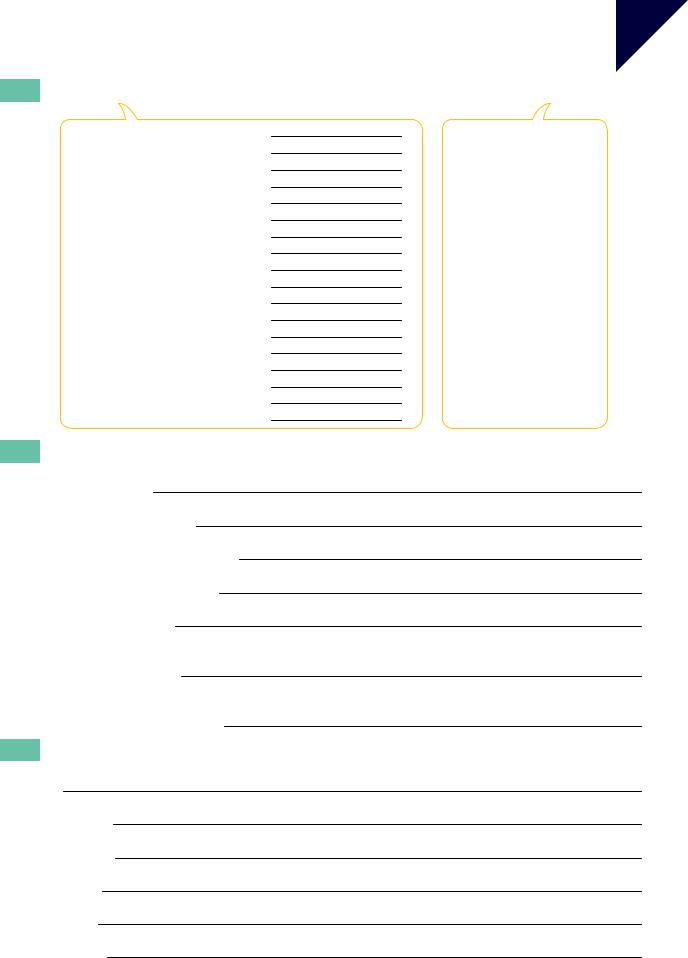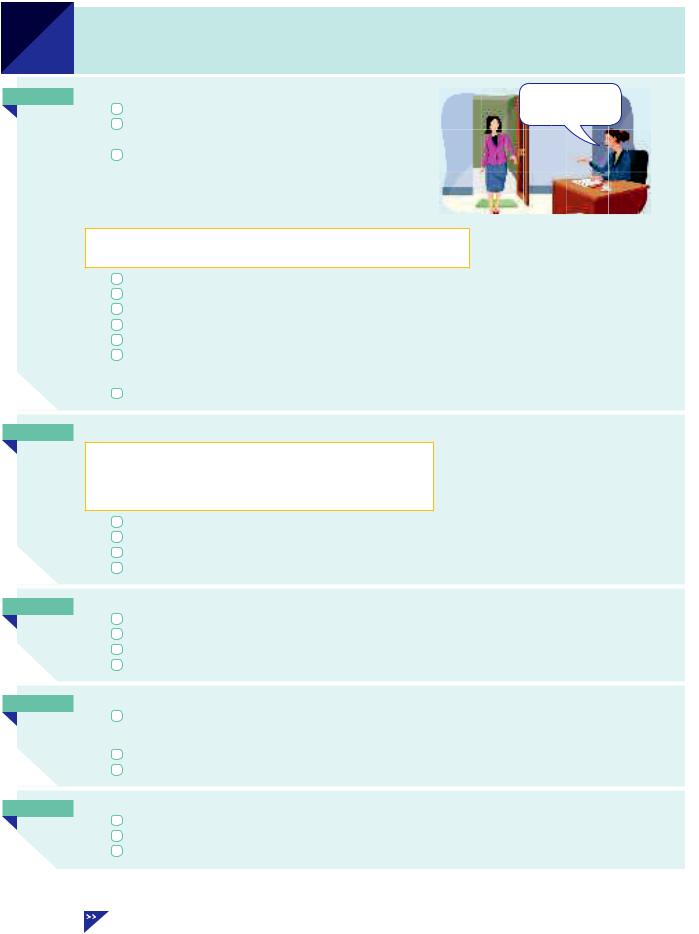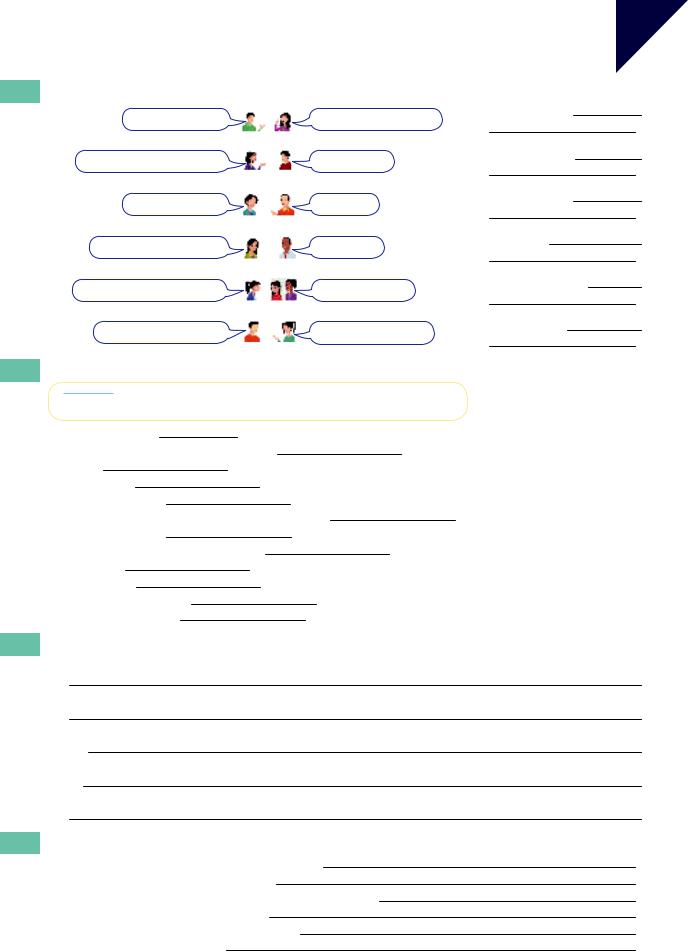
- •Contents
- •Thanks
- •To the student
- •To the teacher
- •3 Present continuous and present simple 1 (I am doing and I do)
- •10 Present perfect continuous and simple (I have been doing and I have done)
- •11 how long have you (been) … ?
- •12 for and since when … ? and how long … ?
- •13 Present perfect and past 1 (I have done and I did)
- •14 Present perfect and past 2 (I have done and I did)
- •15 Past perfect (I had done)
- •16 Past perfect continuous (I had been doing)
- •17 have and have got
- •18 used to (do)
- •19 Present tenses (I am doing / I do) for the future
- •20 I’m going to (do)
- •21 will and shall 1
- •22 will and shall 2
- •23 I will and I’m going to
- •24 will be doing and will have done
- •26 can, could and (be) able to
- •27 could (do) and could have (done)
- •28 must and can’t
- •29 may and might 1
- •30 may and might 2
- •31 have to and must
- •32 must mustn’t needn’t
- •33 should 1
- •34 should 2
- •35 I’d better … it’s time …
- •36 would
- •39 if I knew … I wish I knew …
- •40 if I had known … I wish I had known …
- •41 wish
- •42 Passive 1 (is done / was done)
- •43 Passive 2 (be done / been done / being done)
- •44 Passive 3
- •45 it is said that … he is said to … he is supposed to …
- •46 have something done
- •47 Reported speech 1 (he said that …)
- •48 Reported speech 2
- •49 Questions 1
- •52 Question tags (do you? isn’t it? etc.)
- •53 Verb + -ing (enjoy doing / stop doing etc.)
- •54 Verb + to … (decide to … / forget to … etc.)
- •55 Verb (+ object) + to … (I want you to …)
- •56 Verb + -ing or to … 1 (remember, regret etc.)
- •57 Verb + -ing or to … 2 (try, need, help)
- •58 Verb + -ing or to … 3 (like / would like etc.)
- •59 prefer and would rather
- •60 Preposition (in/for/about etc.) + -ing
- •61 be/get used to … (I’m used to …)
- •63 there’s no point in -ing, it’s worth -ing etc.
- •64 to … , for … and so that …
- •65 Adjective + to …
- •66 to … (afraid to do) and preposition + -ing (afraid of -ing)
- •67 see somebody do and see somebody doing
- •68 -ing clauses (He hurt his knee playing football.)
- •69 Countable and uncountable 1
- •70 Countable and uncountable 2
- •71 Countable nouns with a/an and some
- •74 the 2 (school / the school etc.)
- •75 the 3 (children / the children)
- •77 Names with and without the 1
- •78 Names with and without the 2
- •79 Singular and plural
- •80 Noun + noun (a bus driver / a headache)
- •81 -’s (your sister’s name) and of … (the name of the book)
- •82 myself/yourself/themselves etc.
- •83 a friend of mine my own house on my own / by myself
- •84 there … and it …
- •85 some and any
- •87 much, many, little, few, a lot, plenty
- •90 all every whole
- •91 each and every
- •92 Relative clauses 1: clauses with who/that/which
- •94 Relative clauses 3: whose/whom/where
- •95 Relative clauses 4: extra information clauses (1)
- •96 Relative clauses 5: extra information clauses (2)
- •97 -ing and -ed clauses (the woman talking to Tom, the boy injured in the accident)
- •98 Adjectives ending in -ing and -ed (boring/bored etc.)
- •99 Adjectives: a nice new house, you look tired
- •100 Adjectives and adverbs 1 (quick/quickly)
- •102 so and such
- •104 quite, pretty, rather and fairly
- •105 Comparative 1 (cheaper, more expensive etc.)
- •106 Comparative 2 (much better / any better etc.)
- •107 Comparative 3 (as … as / than)
- •108 Superlative (the longest / the most enjoyable etc.)
- •109 Word order 1: verb + object; place and time
- •110 Word order 2: adverbs with the verb
- •111 still any more yet already
- •112 even
- •114 in case
- •116 as (as I walked … / as I was … etc.)
- •117 like and as
- •119 during for while
- •121 at/on/in (time)
- •122 on time and in time at the end and in the end
- •123 in/at/on (position) 1
- •124 in/at/on (position) 2
- •125 in/at/on (position) 3
- •126 to, at, in and into
- •127 in/on/at (other uses)
- •129 Noun + preposition (reason for, cause of etc.)
- •130 Adjective + preposition 1
- •131 Adjective + preposition 2
- •132 Verb + preposition 1 to and at
- •134 Verb + preposition 3 about and of
- •135 Verb + preposition 4 of/for/from/on
- •136 Verb + preposition 5 in/into/with/to/on
- •137 Phrasal verbs 1 Introduction
- •138 Phrasal verbs 2 in/out
- •139 Phrasal verbs 3 out
- •142 Phrasal verbs 6 up/down
- •143 Phrasal verbs 7 up (1)
- •144 Phrasal verbs 8 up (2)
- •145 Phrasal verbs 9 away/back
- •Additional exercises
- •Study guide
- •Key to Exercises
- •Key to Additional exercises (see page 302)
- •Key to Study guide
- •Index

Unit
52 Question tags (do you? isn’t it? etc.)
AStudy these examples:
You haven’t seen |
No, I haven’t. |
|
Lisa today, have you? |
||
|
It was a good |
Yes, it was great. |
film, wasn’t it? |
|
Have you? and wasn’t it? are question tags. These are mini-questions that you can put on the end of a sentence.
In question tags, we use an auxiliary verb (have/was/will etc.).
|
|
We use do/does/did for the present and past simple (see Unit 51): |
|
|||
|
|
‘Karen plays the piano, doesn’t she?’ |
‘Well, yes, but not very well.’ |
|
||
|
|
‘You didn’t lock the door, did you?’ ‘No, I forgot.’ |
|
|||
|
|
… and a positive question tag ater a |
||||
B |
Normally we use a negative question tag ater |
|
||||
|
|
a positive sentence: |
|
|
negative sentence: |
|
|
|
|
|
|
||
|
|
positive sentence + negative tag |
|
negative sentence + positive tag |
||
|
|
Kate will be here soon, |
won’t she? |
|
Kate won’t be late, |
will she? |
|
|
There was a lot of traf ic, |
wasn’t there? |
|
They don’t like us, |
do they? |
|
|
Joe should pass the exam, |
shouldn’t he? |
|
You haven’t eaten yet, |
have you? |
|
|
|
|
|
|
|
Notice the meaning of yes and no in answer to a negative sentence:
‘You’re not going out this morning, are you?’ |
|
‘Yes.’ |
(= Yes, I am going out) |
|
‘No.’ |
(= No, I am not going out) |
|
|
|
CThe meaning of a question tag depends on how you say it. If your voice goes down, you are not
really asking a question. You expect the listener to agree with you:
‘It’s a nice day, isn’t it?’ ‘Yes, beautiful.’ |
|
‘Paul doesn’t look well today, does he?’ |
‘No, he looks very tired.’ |
‘Lisa’s very funny. She’s got a great sense of humour, hasn’t she?’ ‘Yes, she has.’ |
|
But if the voice goes up, it is a real question: |
|
‘You haven’t seen Kate today, have you?’ |
‘No, I haven’t.’ |
(= Have you seen Kate today?) |
|
You can use a negative sentence + positive tag to ask for things or information, or to ask somebody to do something. The voice goes up at the end of the tag:
‘You couldn’t do me a favour, could you?’ |
‘It depends what it is.’ |
‘You don’t know where Karen is, do you?’ |
‘Sorry, I have no idea.’ |
DAter Let’s … (= Let us) the question tag is shall we:
Let’s go for a walk, shall we? (the voice goes up)
Ater Don’t … , the question tag is will you:
Don’t be late, will you? (the voice goes down)
Ater I’m … , the negative question tag is aren’t I? (= am I not?): ‘I’m right, aren’t I?’ ‘Yes, you are.’
104 |
Auxiliary verbs (have/do/can etc.) Unit 51 |

Exercises |
Unit |
52 |
|
|
|
52.1 Complete these sentences with a question tag.
1 |
Kate won’t be late, |
will she |
? |
No, she’s never late. |
2 |
You’re tired, |
aren’t you |
? |
Yes, a little. |
3 |
You travel a lot, |
|
? |
Yes, I love travelling. |
4 |
You weren’t listening, |
|
? |
Yes, I was! |
5 |
Sarah doesn’t know Ann, |
|
? |
No, they’ve never met. |
6 |
Jack’s on holiday, |
|
? |
Yes, he’s in Australia. |
7 |
It didn’t take long to get here, |
|
? |
No, just ten minutes. |
8 |
You can speak German, |
|
? |
Yes, but not fluently. |
9 |
They won’t mind if I take a picture, |
|
? |
No, of course they won’t. |
10 |
There are a lot of people here, |
|
? |
Yes, more than I expected. |
11 |
Let’s go and have cofee, |
|
? |
Yes, let’s do that. |
12 |
This isn’t very interesting |
|
? |
No, not really. |
13 |
I’m too impatient |
|
? |
Yes, you are sometimes. |
14 |
You wouldn’t tell anyone, |
|
? |
No, of course not. |
15 |
Helen has lived here a long time, |
|
? |
Yes, 20 years. |
16 |
I shouldn’t have lost my temper, |
|
? |
No, but that’s all right. |
17 |
He’d never met her before, |
|
? |
No, that was the first time. |
18 |
Don’t forget to call me, |
|
? |
No, I won’t forget. |
52.2 In these situations you expect your friend to agree with you. Use a question tag in your sentences.
1 You look out of the window. The sky is blue and the sun is shining. You say to your friend: (beautiful day) It’s a beautiful day, isn’t it?
2You’re with a friend outside a restaurant. You’re looking at the prices, which are very high. You say: (expensive) It
3You and a colleague have just finished a training course. You really enjoyed it. You say to your colleague: (great) The course
4 |
Your friend’s hair is much shorter than when you last met. You say to her/him: |
|
(have / your hair / cut) You |
5 |
You’re listening to a woman singing. You like her voice very much. You say to your friend: |
|
(a good voice) She |
6 |
You’re trying on a jacket in a shop. You look in the mirror and you don’t like what you see. |
|
You say to your friend: |
|
(not / look / right) It |
7You and a friend are walking over a small wooden bridge. The bridge is old and some parts are broken. You say:
(not / very safe) This bridge
52.3In these situations you are asking for information, asking people to do things etc.
1 You need a pen. Perhaps Jane has one. Ask her.
Jane, you don’t have a pen I could borrow, do you?
2 You have to move a heavy table. You want Joe to help you with it. Ask him. Joe, you
3 You’re looking for Sarah. Perhaps Lisa knows where she is. Ask her. Lisa, you
4 You want to borrow a tennis racket. Perhaps Helen has one. Ask her. Helen,
5 Anna has a car and you need a lit to the station. Perhaps she’ll take you. Ask her. Anna,
6 You’re looking for your keys. Perhaps Robert has seen them. Ask him. Robert,
105

Unit
53 Verb + -ing (enjoy doing / stop doing etc.)
AWe say:
I enjoy reading. (not I enjoy to read) Would you mind closing the door? (not mind to close)
Chris suggested going to the cinema. (not suggested to go)
Ater enjoy, mind and suggest, we use -ing (not to …).
Some more verbs that are followed by -ing:
stop |
recommend |
admit |
avoid |
imagine |
finish |
consider |
deny |
risk |
fancy |
Would you mind closing the door?
Suddenly everybody stopped talking. There was silence.
I’ll do the shopping when I’ve finished cleaning the flat.
He tried to avoid answering my question.
I don’t fancy going out this evening. (= I’m not enthusiastic about it)
Have you ever considered going to live in another country?
They said they were innocent. They denied doing anything wrong.
The negative form is not -ing:
When I’m on holiday, I enjoy not having to get up early.
BWe also use -ing ater:
give up (= stop)
put of (= delay until later)
go on or carry on (= continue)
keep or keep on (= do something continuously or repeatedly)
I’ve given up buying newspapers. I don’t read them any more.
You shouldn’t put of telling him what happened. You need to tell him now.
Katherine doesn’t want to retire. She wants to go on working. or … to carry on working. You keep interrupting when I’m talking. or You keep on interrupting …
CWith some verbs you can use the structure verb + somebody + -ing:
You can’t stop people doing what they want.
I can’t imagine George riding a motorbike.
Did she really say that? I don’t remember her saying that.
Sorry to keep you waiting so long.
DWhen you talk about finished actions, you can say having done/stolen/said etc. :
They admitted having stolen the money.
But it is not necessary to use having (done). You can say:
They admitted stealing the money.
I now regret saying that. or I now regret having said that.
EOther structures are possible with admit, deny, suggest and recommend. For example, you can say:
They denied (that) they had done anything wrong. (= They denied doing …)
Chris suggested (that) we go to the cinema. (= Chris suggested going …)
I recommend (that) you travel by train. (= I recommend travelling …)
|
suggest Unit 34 being done (passive) Unit 44B Verb + to … Unit 54 |
|
Verb + to … and -ing Units 55C, 56–58 remember / regret / go on Unit 56B |
106 |
go on / carry on / keep on Unit 141A |

Exercises
53.1 Complete the sentences for each situation. Use -ing.
1 |
What shall we do? |
We could go to the zoo. |
|
||
2 |
Do you want to play tennis? |
No, not really. |
|
||
3 |
Let’s go for a walk. |
Good idea! |
|
||
4 |
You caused the accident. |
No, I didn’t. |
|
||
5 |
Can you wait a few minutes? |
Sure, no problem. |
|
||
6 |
You didn’t tell the truth. |
That’s right. I didn’t. |
|
53.2 Complete the sentences. Choose from these verbs (in the correct form):
answer |
apply |
forget |
interrupt |
listen |
live |
lose |
make |
pay |
read |
travel |
try |
|
Unit |
||
|
53 |
||
|
|
|
|
She suggested going |
to |
|
|
|
|||
the zoo |
. |
|
|
He didn’t fancy |
|
|
|
|
|
|
|
|
|
|
|
|
. |
|
|
She suggested |
|
|
|
|
|
|
|
|
|
|
|
|
. |
|
|
He denied |
|
|
|
|
|
|
|
|
|
|
|
|
. |
|
|
They didn’t mind |
|
|
|
|
|
|
|
|
|
|
|
|
. |
|
|
She admitted |
|
|
|
|
|
|
|
. |
|
||
|
|
||
1 |
He tried to avoid answering |
my question. |
|
2 |
I’m trying to concentrate. Please stop |
so much noise! |
|
3 |
I enjoy |
to music. |
|
4 |
I considered |
for the job, but in the end I decided against it. |
|
5 |
Have you finished |
the newspaper yet? |
|
6 |
We need to change our routine. We can’t go on |
like this. |
|
7 |
It’s better to avoid |
during the rush hour. |
|
8 |
My memory is getting worse. I keep |
things. |
|
9 |
I’ve put of |
this bill so many times. I really must do it today. |
|
10 |
I’ve given up |
to learn Japanese. I was making no progress. |
|
11 |
If you gamble, you risk |
your money. |
|
12 |
Would you mind not |
me all the time? Let me speak! |
|
53.3 Put the words in the right order.
1 Did she really say that? I (that / remember / her / saying / don’t).
Idon’t remember her saying that.
2It’s OK if you want to drive my car. I (driving / don’t / it / you / mind). I
3What a stupid thing to do! Can (imagine / so stupid / being / you / anybody)? Can
4We can’t control the weather. We (raining / stop / it / can’t). We
5I’ll be as quick as I can. I (waiting / want / keep / you / don’t / to). I
53.4Use your own ideas to complete these sentences. Use -ing.
1 |
She’s a very interesting person. I always enjoy talking to her |
. |
2 |
I’m not feeling very well. I don’t fancy |
. |
3 |
I’m afraid there aren’t any chairs. I hope you don’t mind |
. |
4 |
It was a beautiful day, so I suggested |
. |
5 |
The movie was very funny. I couldn’t stop |
. |
6 |
My car is unreliable. It keeps |
. |
107
